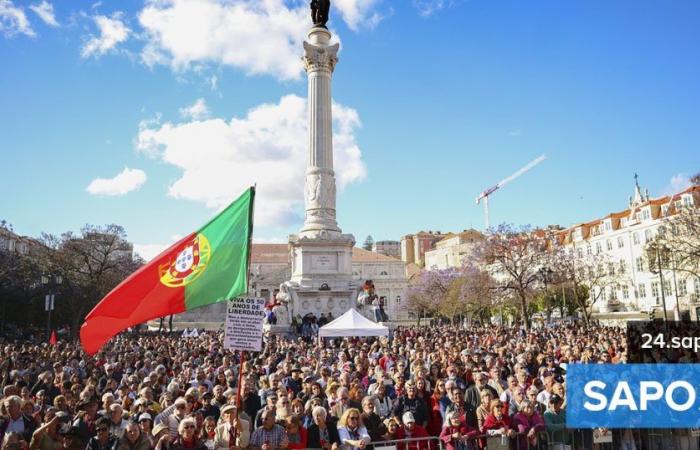
The Jornal de Notícias de Moçambique portal highlights the importance of African people in changes in Portugal.
“The President of the Republic, Filipe Nyusi, stated yesterday [quinta-feira] that the Portuguese people, when celebrating the 50th anniversary of the Carnation Revolution, which takes place on April 25th, must not forget the contribution of the African peoples” writes the Mozambican newspaper about the head of state’s statements.
For the Mozambican President, the presence of representatives from these countries at the celebration is a tribute to the “heroes of the anti-colonial struggle and the young people who put an end to the oppressive regime”.
The participation of heads of state and representatives of the countries of the Community of Portuguese Speaking Countries in the celebrations of the 50th anniversary of the 25th of April 1974 is also a prominent subject in Jornal de Angola, which mentions the presence of President João Lourenço.
In the edition of the publication Expresso das Ilhas, from Cape Verde, a news article accompanied by a photograph states that the MpD (Movement for Democracy) bench remembered the 50th anniversary of the 25th of April and renewed its commitment to the ideals of freedom and justice, ” through a political declaration”.
“On this April 25th, we celebrate not only the date, but we also renew our commitment to the ideals of freedom and justice. Cape Verde is a nation that seeks to strengthen and value these fundamental principles”, expressed deputy Euclides Silva, representing the parliamentary group.
In particular, the same portal publishes statements by Cape Verdean academic Daniel dos Santos who considered the 25th of April to be one of the “most important and memorable” dates in the history of Cape Verde, despite not having fulfilled his promises towards the country.
In Brazil, the Folha de São Paulo portal publishes photographs of the celebrations and the electronic edition of Globo headlines: “‘Fascism never again’: Tens of thousands of people celebrate 50 years of democracy in Portugal”
Globo states that the celebrations of the 50th anniversary of the Carnation Revolution “take place against a backdrop of a resurgence of the far right and after statements by the President (Marcelo Rebele de Sousa) about historical reparations.
This is a “Toxic Theme”, writes Globo, which accompanies the texts and photographs of the celebrations on the streets of Lisbon.
The website of the Spanish newspaper El Pais publishes a photograph of an armored vehicle used in 1974 by the Armed Forces Movement (MFA) surrounded by citizens with red carnations.
“Portuguese take to the streets to demand the freedom gained with the Carnation Revolution. The extreme right despises April 25, 1974 and attacks Marcelo Rebelo de Sousa for offering reparations for colonialism”, writes the El Pais correspondent in Portugal in today’s edition.
In the newspaper La Vanguardia, columnist Félix Flores writes today that April 25, 1974 “is a military coup that deserves to be celebrated”
“The President of the Republic, Marcelo Rebelo de Sousa, stated, on the eve of the anniversary, that ‘the right shares the same pride in the peaceful transition’ that the 25th of April represents. For some, this means emptying the content of a civil revolt and military man who was left-wing”, adds the article.
The same portal publishes the work “Filming the Revolution” with color photographs of the Carnation Revolution.
The British newspaper Guardian publishes a gallery with more than 10 photographs from Thursday’s celebrations in the Portuguese capital.
“Thousands of people celebrated on Thursday, in Lisbon, the 50th anniversary of the Carnation Revolution, which overthrew Europe’s longest fascist dictatorship and ushered in democracy. The revolution, almost bloodless, was led by a group of junior army officers who wanted democracy and an end to the long wars against independence movements in the African colonies”, writes the Guardian.
The same newspaper publishes an article by academic Vicente Valentim about 1974 and the growth of the “extreme right”.
“In Portugal, we are celebrating 50 years of freedom. So, why is the extreme right making a comeback?”, asks the Portuguese political scientist from the University of Oxford and author of the book “The End of Vergonha”.
“It is still unclear how Portuguese democracy will respond to the new challenges posed by the rise of the far right and the end of the traditional two-party system. What is clear, however, is that Portugal finds itself at a crucial political crossroads”, writes the academic in the Guardian.
On the website of the French newspaper Libération, Marcelo Rebelo de Sousa’s statements about reparations for the crimes of colonization are covered in an article accompanied by photographs.
“At a time when several organizations are calling on former colonial empires to assume their responsibilities, the Portuguese head of state, Marcelo Rebelo de Sousa, announced that he wants to “pay” for the crimes committed by his country”, writes Libération.
Le Monde publishes a photograph of Vasco Lourenço, member of the MFA and president of the 25 de Abril Association, alongside Salgueiro Maia’s widow.
“On April 25, 1974, the Portuguese military overthrew Salazar’s authoritarian regime (…). On the occasion of the fiftieth anniversary of this revolution, those involved and those who witnessed it reconstruct the few hours in which the old world gave way to the new “, says the Le Monde article accompanied by photographs of popular celebrations.
Tags: April #25th International press highlights parade colonial reparations Current Affairs
--




